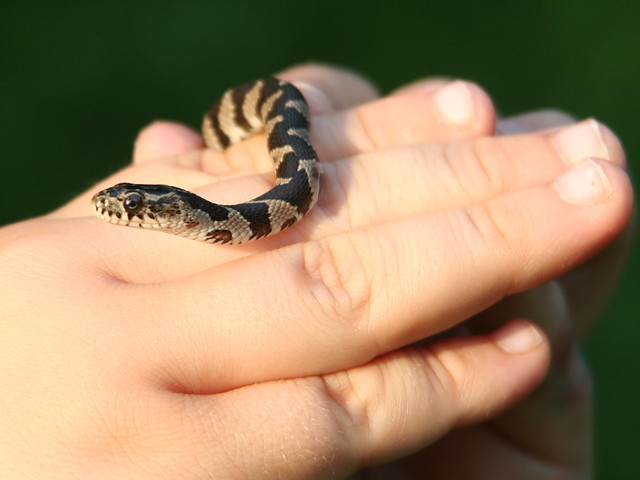
On Labor Day weekend exploring my brother's property with my 8-year-old son, we came across this delightful neonate northern water snake. According to my field guide, the new generation is born late July or August, so this snake is probably about a month old. As I was thinking more about this special encounter, I was marveling at how this little guy, little more than 1/10 the size of a full-grown adult, was such a perfect replica of his parents (apart from "personality" as the adults have a very bad reputation for being quite ill-tempered). Of course reproduction is such a common part of life taking place all around us that it's quite easy to not give it a second thought, but without it none of us, indeed no living thing, would be here.
When I stop to think about it, I can't see the process of reproduction as anything short of miraculous. In the case of this water snake, a male and female meet up in May and breed, then over the course of the next three or four months inside the female's body 20 to 50 perfect miniature replicas are formed. When the time comes, they emerge (live birth in the case of water snakes as opposed to eggs for many other snakes) fully functional reproductions of their parents, able to hunt their own food, grow, find shelter, avoid predators, survive the winter and, in time, to reproduce. The fact that ALL living things reproduce in one way or another may cause us to take this process for granted, but rather than detracting from the miraculous process that this is, it should cause us to marvel at the millions of variations, large and small, that all accomplish the same task -- the preservation of life.
Nor should the fact that the process can be observed and objectively described cause us to miss out on the wonder of it. Even if scientists were able to observe, analyze, understand and explain the whole process from beginning to end, the fact is we are totally incapable of replicating the process in any manner remotely so marvelous. What's the best human-created analogue? Software viruses that replicate themselves across computer systems? As cleverly designed as these may be, they are orders of magnitude more simplistic than the simplest forms of reproduction among living things.
So where does this universal ability to reproduce come from? If one assumes that life is the result of random processes in the primordial soup, then it is inconceiveable to me (excuse the pun) that even IF through some happy circumstances a collection of chemical compounds that could be regarded as "living" arose from the muck, that this organism would arrive with the built-in capacity for reproduction. And if it does not have the capacity for reproduction, where does it go from there? In contrast, the Biblical account of creation indicates from the very beginning that God created all living things with the ability to reproduce (Genesis 1:11-12, 22, 25, and 28). I see reproduction as yet another miraculous facet of creation that bears testimony to the awesome power and wisdom of our God.
